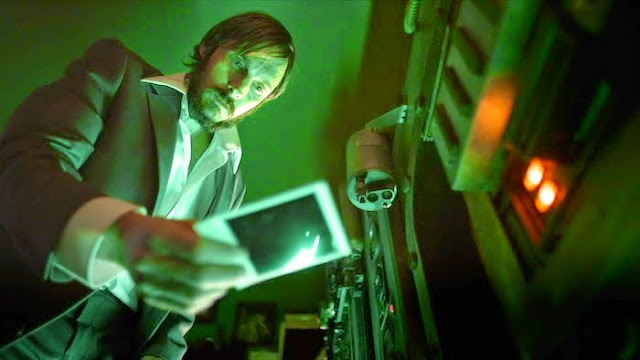It’s easy, when you watch a time travel movie, to picture
how you might use this technology in your own unique way to benefit yourself,
and how you would skirt the hazards encountered by the folks onscreen. In
Time Lapse, the new sci-fi movie from director Bradley King,
three friends stumble across a camera that takes pictures 24 hours into the
future, and they attempt to pull this off, not faring much better than those
who came before them. This movie falls in the same general category as Colin Trevorrow’s
Safety Not Guaranteed, a low-budget genre flick with more
ideas than money that pop up at film festivals, and as long as they’re as good
as that film and Time Lapse, there’s nothing wrong with
that.
Finn (Matt O’Leary from Spy Kids, all
grown up now) is a starving artist, frustrated by his lack of success, dreaming
of more than working as a glorified toilet repairman managing an apartment
complex. He lives with his girlfriend Callie (Danielle Panabaker, The
Flash), who he spends most of his time not appreciating—she mothers
him, putting up a front of her own—and his compulsive gambler best bro Jasper
(George Finn). When they check in on an elderly neighbor (John Rhys-Davies, who
only shows up onscreen in photos), they find his body and a massive camera
aimed at their apartment that takes snapshots of the future.
They don’t call the police or authorities, because why would
they, and the friends rationalize utilizing the massive contraption for their
own greedy ends. Jasper uses this window to tomorrow to get the winners of the
dog races he gambles on, while Finn copies the completed paintings that show up
in the photos every day. Everything is great at first, but if you suspect they
don’t stay that way forever, gold star for you. Before too awful long, the
camera starts spitting out images of unpleasant events that cause the once
tight crew to go for each other’s throats, and things spiral quickly out of
control.
While all of this happens, Time
Lapse allows these events to unravel at a deliberate, measured pace,
letting the conflict stew and bubble. Initially, the benefits outweigh the down
side, the trio can cope, but the tension in King and co-writer BP Cooper’s
script gradually ratchets up. They’re meticulous in turning the screws,
dropping hints, laying the groundwork, letting the characters simmer until
they’re pushed to the point where they can’t help but boil over.
A relatively contained three-hander, the main leads all
deliver strong performances that are engaging and add to the tension. They feel
like real friends and share a legitimate bond, which accentuates the layers of
tension that develop over time. Finn, Callie, and Jasper have a fluid dynamic,
with allegiances morphing and shifting along with changing circumstances,
reveals, and deteriorating mental states. They have an extensive, complex
history, and they all come with their own baggage and secrets that come to
light in natural, satisfying ways. You connect with them and wonder how, and
care if, they’re going to extricate themselves from their problematic
situation.
You can’t help but notice notes of Hitchcock and De Palma
throughout Time Lapse. These obvious influences show up in
the direction, the contained setting, and the unspooling conflict. There’s even
an eerie string score that is reminiscent of Bernard Hermann, Hitchcock’s
primary composer, which drives this home. But while there are definite points
of inspiration, Time Lapse still manages to do its own
thing. Beats of dark, gallows humor add breaths of levity for a moment,
assuaging the tension a second here and there, while it increases the pressure
elsewhere. It all comes together to keep you on the proverbial edge of your
see.
Limited in scope and scale, Time Lapse
uses these boundaries and restrictions to great effect. The world never extends
beyond the courtyard of their dumpy apartments—you do look out a few times, but
it’s through a wrought iron gate that brings to mind the bars on a prison
window, only enhancing the feeling that you, and the characters, are trapped by
their fate and time. Outside comes to represent escape and freedom, but whether
or not they can achieve this, or want to, you’re not sure.
You get a few questionable jumps of logic in the plot, and
there are a few times you’re not sure if all of the threads tie together in the
end. The characters accept the general premise without any questions, and there
are times you might have cause scratch your head and wonder, but in general
these instances are minor bumps in the road. All in all, it feels like an
extended, well-executed episode of Twilight Zone.
Time Lapse is a taut, modest sci-fi
thriller that makes the most of what it has to work with, creating something
greater than the sum of its parts. The story is quick but never rushes over its
104-minute run time. When you watch this a second time, you’ll notice the trail
of hints and clues that King and Cooper sprinkle to mark their trail, but as
they unravel, they come as surprises. It may not reach the highs of the films
mentioned earlier, but Time Lapse is definitely one to check
out, imparting an important lesson: Don’t mess with time.
[Grade: B]



No comments:
Post a Comment